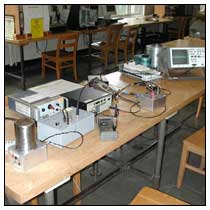Determination of Boltzmann's constant, k and the centigrade temperature of absolute zero from measurements of Johnson noise. Determination of the average charge, e, of the electron from measurements of electrical shot noise.
The mean square of the fluctuating voltage (Johnson noise) across a conductor with zero mean current is measured as a function of the resistance and temperature of the conductor, and a value of the Boltzmann constant is derived from the results according to the Nyquist theory of Johnson noise.
Lab Guide (PDF)

Johnson noise and shot noise lab. (Image courtesy of Junior Lab staff.)
References
Johnson, John B. "Thermal Agitation of Electricity in Conductors." The Physical Review 32, no. 1 (1928): 97-109.
Nyquist, Harry. "Thermal Agitation of Electric Charge in Conductors." Phys Rev 32, no. 1 (1928): 110-113.
Reif, Frederick. "Fourier Analysis of Random Fluctuations." Section 15.13-15 in Fundamentals of Statistical and Thermal Physics. New York, NY: McGraw Hill, 1965, pp. 582-587.
 Van der Ziel, Aldert. "Noise Figure," and "Friiss' Formula-Noise Measure." Sections 3.2 and 3.3 in Noise in Measurement. New York, NY: Wiley, 1976, pp. 30-38. ISBN: 9780471898955.
Van der Ziel, Aldert. "Noise Figure," and "Friiss' Formula-Noise Measure." Sections 3.2 and 3.3 in Noise in Measurement. New York, NY: Wiley, 1976, pp. 30-38. ISBN: 9780471898955.
Kittel, Peter. "Comment on the Equivalent Noise Bandwidth Approximation." The Review of Scientific Instruments 48, no. 9 (1977): 1214-1215.
Kittel, Peter, W. R. Hackleman, and R. J. Donnelly. "Undergraduate Experiment on Noise Thermometry." American Journal of Physics 46, no. 1 (1978): 94-100.
